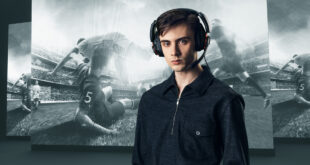Developer:
Lionhead
Publisher:
Microsoft
Platform:
Xbox 360
The Music Team:
Composer: Russell Shaw
Orchestrator/conductor: Allan Wilson
Engineer/executive music producer: Peter Fuchs
Fable II Music Schedule:
Scoring, composing and orchestrating: eight weeks
Orchestral recording: one week
Choir and final mix: one week
Game implementation: two weeks
By any measure of video games, it’s not a huge stretch to call Fable II a triumph. First and foremost it’s all about playing a part in a dramatic story. How you progress through that story, and the actions you take along the way, can trigger different outcomes and change the way you’re perceived in the world, says the game’s composer and audio director Russell Shaw. “Emotions are key in what we’re trying to achieve and there are some very poignant moments.”
From the outset, the team was determined to go all-out for serious acting talent, better writing, charismatic characters, more emotion and scripted music – all feeding Shaw’s overall vision for the soundtrack.
“The story is about growing from a child to a hero. As such, the music box features a lot to reflect the character’s lost childhood, and we used Tiffins Boys Choir for many choral sequences for similar reasons. We wanted the music to convey the world of Albion but also enhance the story. Each region had its own music built on descriptive keywords: Bowerstone, for example, is typified by the words Celtic, Scottish, folk and gentle.
“Each scripted moment had an accompanying scored piece. I knew we’d have to use a pretty hefty orchestra to achieve the richness we were after, and also that we’d need to record solo instrumentalists for the folk elements. I’m very lucky in that Peter gives me free reign to do what’s right for the game. The game itself provides so much inspiration – musical ideas pop into my head as I’m playing it for the first time.”
Shaw first sequenced his compositions in Cubase using The Vienna Instruments VST Symphonic Library and Reason’s orchestral set before working with orchestrator and conductor Allan Wilson and the Slovak National Symphony Orchestra in Bratislava.
Meanwhile, a scratch mix from the MIDI score was used as placeholder in-game until the full mixdown was done at Phoenix Sound, Pinewood, UK.
Structurally, the music mainly compromises detailed scripted stereo cues and appropriate atmospheres, but a different approach was taken for combat, Shaw explains.
“Peter wanted the player to feel the combat sequences were building in intensity; that the hero was adding to the score depending on how well (or how poorly) he/she was doing. So we had five stereo streams which built in intensity – from, for example, a drone right up to full-on rhythm tracks. Each track would be faded in at key moments in the combat: new enemies joining the fight, maybe, or a new weapon selected. We limited the number of tracks heard per combat sequence, so if you’re fighting a small beetle group you only hear maybe one or two tracks, whereas if you’re fighting a boss you get four or five tracks.
“Additionally, we included two choir tracks in sync which gradually fade in as the player strings together more and more successful combat attacks on an enemy. If you’re fighting really well you’ll be hearing five stereo music tracks and two stereo tracks of choir. If you get hit during an attack the choir volume is drastically reduced. Further still, we’ve added musical/percussive stabs the instant a player uses his sword effectively – like a flourish or a combo move.
According to Shaw, reaction to Fable II’s music from fans and peers alike has been gratifying and humbling: “The score is far less melodic than Fable I as I wanted to get away from ‘tunes’. I was a bit worried about this, as fans had expectations based on the original title but, thankfully, the music was well-received and nominated for BAFTA and AIAS awards. Given that I had very little time, the great reaction and overall quality and musicianship of the recordings is something for which I’m really grateful.
Ask Shaw how he feels about the current state of the game music industry and he’s unequivocally upbeat.
“This is a brilliant time to be in game music. The divisions between being considered a movie or game composer have pretty much eroded completely; all that’s left is ideas. We should be much more thoughtful about how we use those resources.
“I’ve played games with wall-to-wall music and it quickly becomes very tiring, so I’ve always strived to have non-musical areas of the game to give the musical areas more impact. There’s also a growing tendency in the industry to use orchestra just because the budget allows for it rather than the game needing it. On our future titles, I will continue producing music for the game’s sake rather than for the music’s sake.”

 MCV/DEVELOP News, events, research and jobs from the games industry
MCV/DEVELOP News, events, research and jobs from the games industry


